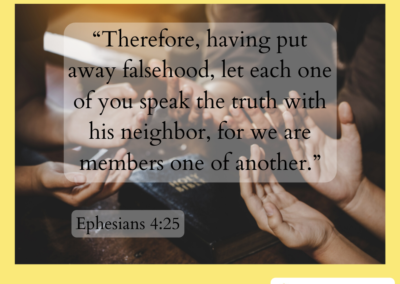“You shall not bear false witness against your neighbor.”
Exodus 20:16
“Lying lips are an abomination to the Lord, but those who act faithfully are his delight.”
Proverbs 12:22
“Finally, brothers, whatever is true, whatever is honorable, whatever is just, whatever is pure, whatever is lovely, whatever is commendable, if there is any excellence, if there is anything worthy of praise, think about these things. What you have learned and received and heard and seen in me—practice these things, and the God of peace will be with you.”
Philippians 4:8-9
“You shall not steal; you shall not deal falsely; you shall not lie to one another.”
Leviticus 19:11
“Do not lie to one another, seeing that you have put off the old self with its practices.”
Colossians 3:9
“Jesus said: “I am the way, the truth, and the life. No man comes unto the Father, but by me.”
John 14:6
“Therefore, having put away falsehood, let each one of you speak the truth with his neighbor, for we are members one of another.”
Ephesians 4:25
“But the wisdom from above is first pure, then peaceable, gentle, open to reason, full of mercy and good fruits, impartial and sincere.”
James 3:17
“Whoever can be trusted with very little can also be trusted with much, and whoever is dishonest with very little will also be dishonest with much.”
Luke 16:10
“Better is a poor person who walks in his integrity than one who is crooked in speech and is a fool.”
Proverbs 19:1
“A dishonest man spreads strife, and a whisperer separates close friends.”
Proverbs 16:28
“It does not rejoice at wrongdoing, but rejoices with the truth.”
1 Corinthians 13:6
How can you use Bible Verses?
- Start a discussion: Bible verses can start a discussion about a character trait at the beginning of a meeting or the dinner table. You can ask questions about what it means, how they have seen the trait demonstrated in their own lives, or how they can develop it themselves.
- Use Bible verses as writing/journal prompts: Ask them to write a short essay about a Bible verse to help them think more deeply about its implications for their lives.
- Post Bible verses: You can post Bible verses where they will be seen/heard often – classroom, breakroom, lobby, dining room, email signatures, video bulletin boards, morning announcements, social media, etc.
- Read Bible verses aloud: You can read Bible verses aloud to your children during mealtimes, bedtime, or any other time you spend together.
- Make it fun: You can make it even more fun by incorporating games, activities, or crafts. Let children decorate signs with Bible verses to hang in the classroom or a bedroom door. Record children saying it and post it on social media.



